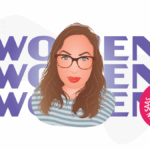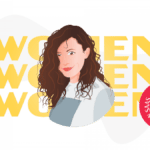Women in SaaS: Diana from Bloomreach
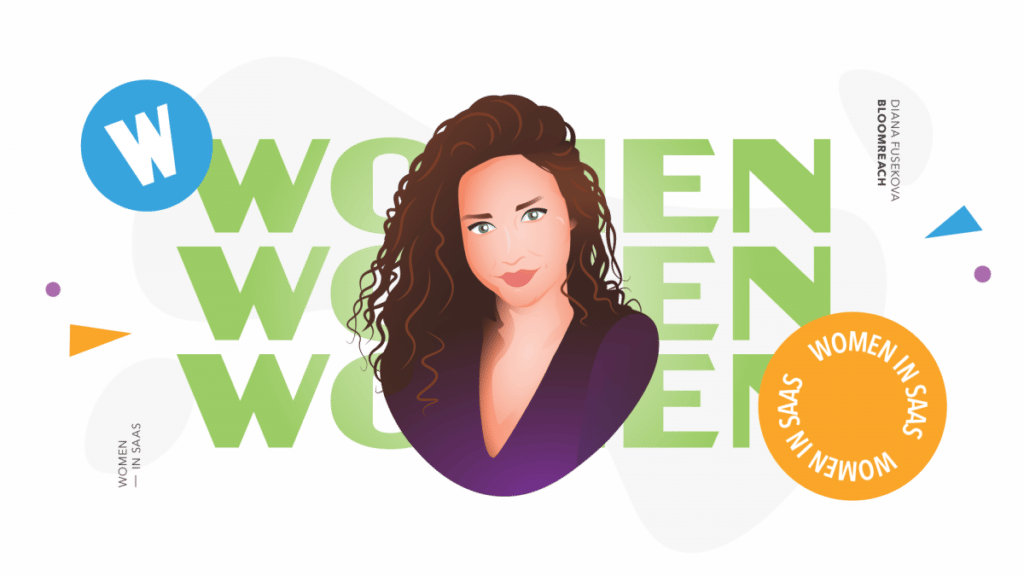
It is our pleasure to shine a light on a woman who has paved her own way by fearlessly moving from country to country, no matter the unknowns. She is precisely the empowering force that our Women in SaaS bi-weekly interviews hope to highlight.
Diana comes to us from Bloomreach, the fast-growing commerce software provider. With a business background to drive her tenacity and a lifelong inclination towards the complex, Diana’s nature found its rightful place in the world of innovation—in an industry as restless as her pursuit of always remaining bold.
Hi Diana, can you please introduce yourself, your role and the company you work for?
My name is Diana Fusekova and I am a digital marketer, avid learner and growth hacking enthusiast.
As a part of the demand generation team, I am currently helping Bloomreach—a fast-growing, Silicon Valley software provider and leader in digital and commerce experience—generate high-quality leads for sales primarily by owning the global webinar program.
My responsibilities range from initiating campaign ideas and concept creation to developing marketing strategies and project management. I look after internal and external communication, as well as the technical setup in our marketing automation tool, Marketo.
I’ve been with Bloomreach for almost a year and a half, although it feels like much more when I look at the number of projects I’ve worked on and the experience I’ve gained.
Inspiring stories from women in tech
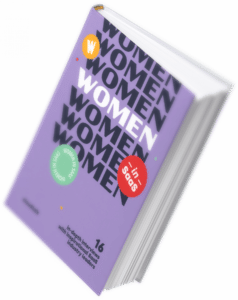
What inspired or led you to enter the SaaS field/tech startup world?
I didn’t particularly set out to join the tech sector. During my studies, I worked in marketing for a B2C e-commerce business and took on freelancing projects. This led me to a B2B multinational enterprise right after getting my degree, where I stayed for a number of years before I started working at Bloomreach.
Why Bloomreach? Feeling eager to conceive new ideas and work with innovation, I decided to pursue a career that would challenge me, propel me out of my comfort zone beyond any professional working environment that felt familiar, and thus give me the opportunity to try something entirely new, fresh and dynamic.
It wasn’t really the opportunity to work within a tech company that drew me to Bloomreach. My main aspiration was getting the chance to work in a fast-paced culture alongside a group of inspiring colleagues who proudly embrace and represent a company’s values, in a working environment that celebrates creative freedom.
Bloomreach is an environment that challenges me professionally and stimulates intellectually while allowing me to be true to myself—meaning that the company puts its employees first. In fact, it’s been my experience that tech companies prioritize employee happiness more often and in more ways than any other industry I’ve been a part of.
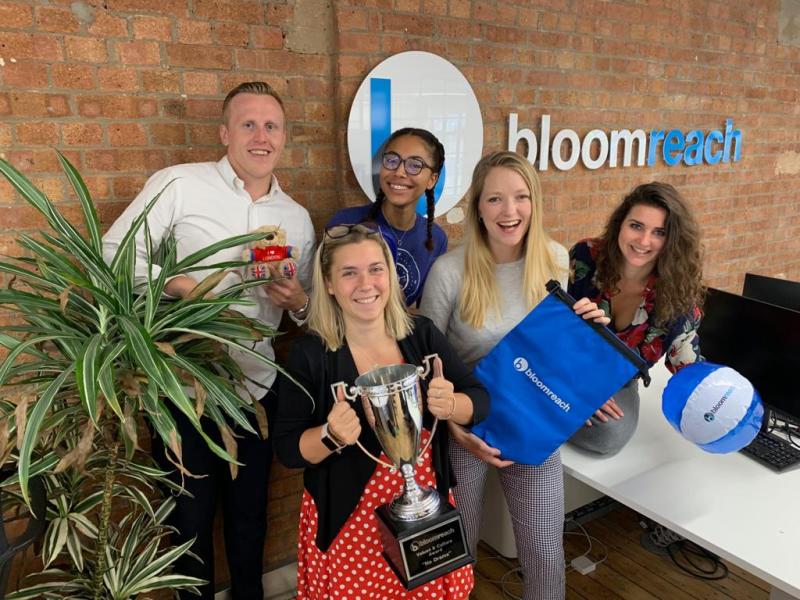
Did you study technology? Do you feel it’s important to have a tech education in order to get a job in a tech startup?
I did not. I actually used to find the tech industry a bit scary. But even then, the unknown and complex was always appealing to me. As an avid learner who enjoys challenges, what fascinates and drives me most about the industry is the continuous improvement and education.
I studied applied languages (German and English) at the University of Economics in Bratislava and then did my Master’s in International Business in Austria. My background is very business-focused, but even business is impacted by tech—it helps improve operations processes, optimize business functions, increase data processing capacity and more.
I really couldn’t have escaped tech, regardless of my career choice. My job in marketing is to figure out how to combine the creative side of the discipline–using powerful narratives to tap into people’s wishes and aspirations–with the technical side of data, digital engineering and analytics.
When it comes to transitioning into tech, everyone in a position similar to mine worries about a lack of tech skills. But I think that what matters more is soft skills. Tech is a flexible industry, with a diverse workforce. The willingness to learn combined with curiosity, creativity, flexibility and an open mind are key factors in being successful in your tech career, regardless of the role.
Personally, I’m constantly seeking new ways to bring innovative solutions. What can I do to change the world? How can I apply technology in ways that solve either new or old problems? The tech industry is giving me exactly what my (career) soul always yearned for.
What was the biggest challenge for you when entering the tech field and how did you manage to overcome it?
Getting my head around product knowledge, a feeling which I think never goes away. There are constant product updates and new features. But I’m also surrounded by a team of people that I can rely on if something isn’t clear, or if it feels completely unknown—which it often does when you work at a software company.
In a marketing role, you may not be developing an app or a product, but you do need to understand how it works on a higher level. For instance, it informs your choice of wording you use when copywriting. When you know a topic inside and out, you’re able to keep descriptions simple so that they’re comprehensive even for first-time website visitors.
Another thing I was struggling with was to keep up with the pace of my team. All of my colleagues are incredibly motivated and smart, which inspires me to meet their standards every day—or even exceed them. In the end, we are one team that empowers each other, so friendly competition is a way to raise the standards of the team.
Thinking back to your journey and how you arrived at where you are today, is there anything you’d change if you could?
I’ve lived in more than six countries and was only 24 when I decided to move to London, the business capital of Europe, in hopes of finally finding a home. 🙂 I also used to go to the U.S. for summer jobs as a student, which helped me learn the language and travel the country.
After finishing my Bachelor’s degree, I moved to Austria to improve my German and pursue my Masters’s. I worked on several projects abroad, including work in the Dominican Republic for six months as an online marketing and social media specialist, and a short stint in Munich focused on international SEO optimization.

I am incredibly grateful for all of the opportunities and can honestly say they have been some of the greatest lessons of my life. Living in so many places, you come to feel like you belong everywhere but nowhere, that your home is in one suitcase… but your family and friends are all over the world. I wouldn’t change anything because I believe each experience taught me something and helped me get where I am now.
What piece of advice would you give to your freshman self?
Without any friends or a job waiting for me, I moved to London—a place that can be brutal but is full of opportunities; it’s up to you how you seize them. My advice to my younger self would be not to be as naive as I was then.
I thought that with all of my experience and education, London was just waiting to give me the best job opportunity. Still, had I not had this naivety, I might have stayed back in Slovakia and would have missed all the amazing opportunities I discovered on my journey.
I also learned two things in London. The first lesson was something they don’t teach you at school, and that is to be driven, to be constantly on the lookout for new opportunities and to keep connected (this one is from my mentor – Cheers, Mark!). The second was that it doesn’t really matter which degree you have; what matters is your attitude and experience.
Don’t get me wrong. Education teaches you transferable skills, such as the ability to research, analyze and manage your time. But what is really important is to show you’ve got the grit to succeed.
Only 3% of females say a career in technology is their first choice. Why do you believe working in a tech startup or SaaS is a good career path?
It’s FUN! Bloomreach actively cultivates a sense of joy and fun at work! What other business would hire an Elton John impersonator for their biggest event?
The projects we work on and the ideas we create are quirky! But that’s what makes our job entertaining—how we innovate and stand out! And if an idea doesn’t work out, you can quickly change it as the industry is very flexible. Plus, with innovation comes learning, so you will continually find yourself learning something new!
The industry’s character resonates with what I love and enjoy; it’s dynamic, fast-paced and innovative. I sometimes get easily bored, but tech keeps me busy and entertained with all the changes and experiments.
Do you see a lack of female presence at your startup? If so, how do you think this could be changed?
Interestingly, my team is more female-dominated; out of 13 team members, there are only two men. I have some fantastic female colleagues that understand that as women in tech, we share similar feelings and challenges.

To support each other, we’ve created a female-friendly casual community called FAB, where we grab lunch or organize casual meet-ups to empower each other and deal with our fears and challenges together.
What do you see as the added value of having more female teammates at a tech company?
Generally speaking, women bring the heart to the table, and a naturally wide range of emotional intelligence such as nurturing, empathy and passion—all the soft skills that are needed for business today, and that the best leaders should possess. To help transform workplace cultures, these qualities are instrumental.
In addition, the final tech product serves males as well as females, so getting more women in tech will lead to innovations that reflect the wants and needs of half of the population.
How can male teammates support their female colleagues in growing professionally? And do you have the first-hand experience with this positive behaviour?
Equal involvement of men and women in all activities/meetings is the foremost sign of support. Similarly, so is mentoring; helping women get to the next stage by enabling and empowering those who are already on the team to take on opportunities, investing in them and offering them the best career path.
Team activities and spending time together outside of work is another critical aspect that encourages colleagues to get to know each other, but that also makes everyone feel like they belong—regardless of gender, seniority, ethnicity, age or life stage.
I have been very lucky in terms of the people around me. Most of the men I work with are aware that there might be gender inequality in the workspace and it has happened to me quite often that the idea to empower women and support them came as their initiative.
What would you recommend to women who would like to enter the tech field?
Start with yourself and how you see yourself. I’ve been shocked to see so many smart, successful and beautiful women having low self-esteem. I believe the journey starts within us; if we can see it, we can make it happen.
Can you also recommend any educational/reading material to women who would like to enter the tech field?
I’ve recently finished a book from Brene Brown, Daring Greatly, on the power of vulnerability and it really opened my eyes up to an entirely new way of approaching shame, vulnerability, anxiety and leadership!
The idea of ‘not enough’ is so prevalent in our society. The opposite of scarcity is knowing that you’re enough. Your business is enough. Your success is enough. This drives our willingness to show up, which makes us a little braver. And that’s the first step on the path of living boldly and daring greatly, and the first step to making a decision to enter the tech field.
There are a couple of great books that were recommended to me by my female friends working in tech, and that are on my bucket list: Brotopia: Breaking Up the Boys’ Club of Silicon Valley, by Emily Chang, and Female Innovators at Work: Women on Top of Tech, by Danielle Newnham.
And finally, having a mentor that works in tech has helped me get to know the industry more, and helped me see where I need to improve.
People working in tech are usually very busy. How do you manage your work-life balance? Do you have time for some side projects/ passion projects?
It can get absolutely crazy busy, as the industry is very fast-paced and dynamic. Having a routine is key to managing my work-life balance and staying focused.
I start my day with 30 minutes of yoga followed by 15 minutes of meditation, which helps me to stay focused and sane when life gets out of control. I have designated screen downtime, especially during lunch breaks when I read a few pages of a book. My wellbeing and health are my first priority because I understand that without that, no quality work can be done.
I feel very grateful for having such a great life, so giving back to the community is something that makes me fulfilled and energized. I regularly participate in charitable activities such as the mentoring program with The Big Alliance or raising money.
Running is another source of energy (physical and creative) for me. Last year, I ran my first marathon—the Richmond marathon in London. I also gave myself a personal goal to raise money for Justice and Care, a charity that rescues victims from slavery, brings criminal networks to justice and sparks systemic change.
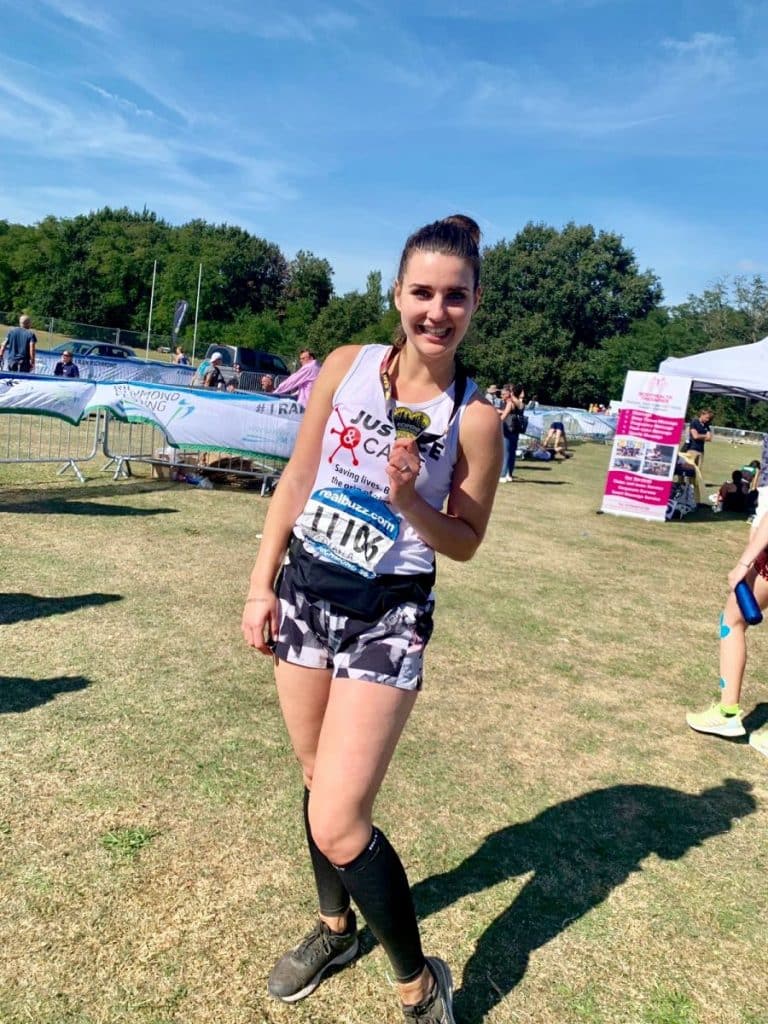
My inspiration came from Viktor Frankl, a prominent Jewish psychiatrist and neurologist. In his book, Man’s Search for Meaning, Frankl writes, “The last of the human freedoms—to choose one’s attitude in any given set of circumstances, to choose one’s own way.” And I ran for those who don’t have the freedom while challenging my attitude and resilience towards suffering.
In case you missed it, here’s another story – Zuzana from Minit
Women in SaaS initiative
Did you know that only 3% of females say a career in technology is their first choice and only 5% of leadership positions in technology are held by a woman? With our new initiative – Women in SaaS interviews, we want to inspire more women to join SaaS field & technology and combat prejudges connected to technology.
Every two weeks, you can look forward to interviews with inspirational ladies who decided on a career path in SaaS. In our next article, we will talk to Jaana, Lead Project Manager from Pipedrive.















